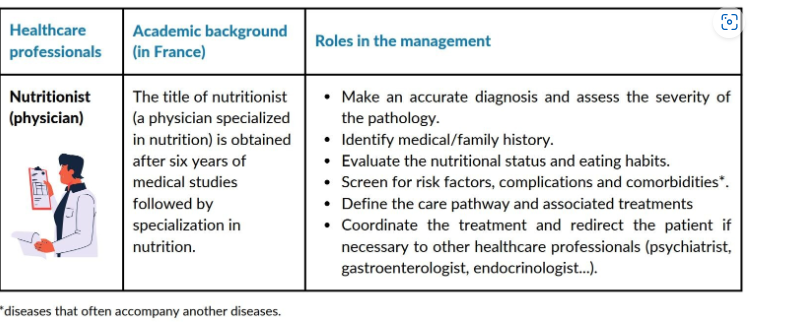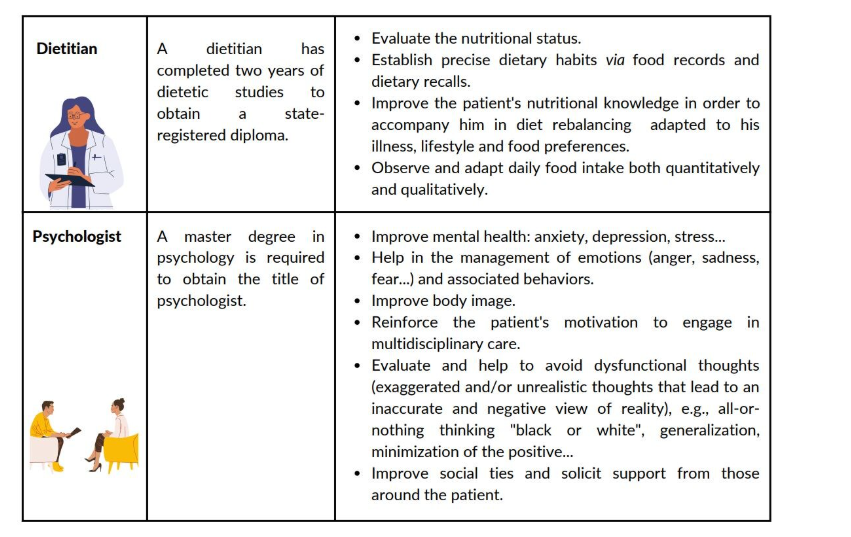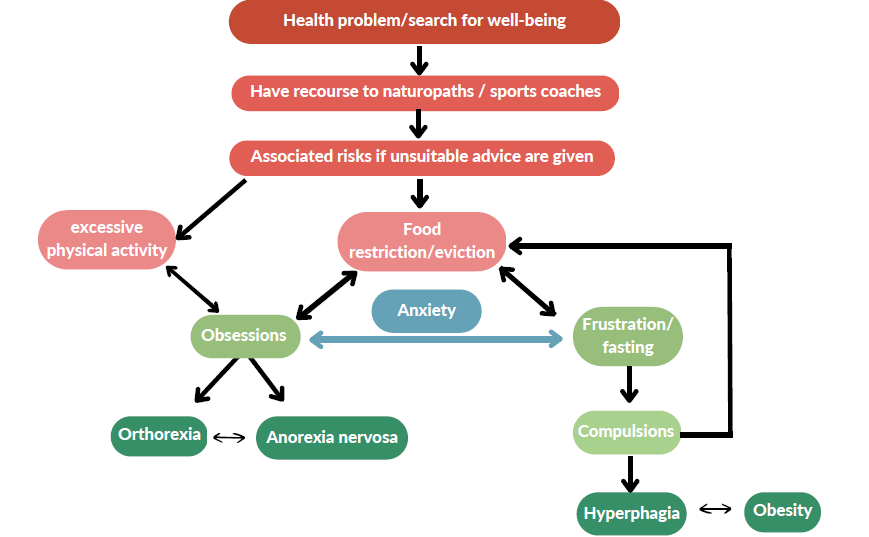Management of eating disorders and obesity: who is involved ?
Source : Nutriactis/Rouen-Normandie hospital
Summary
- What is the role of each healthcare professional involved in the management of ED and obesity (in France)?
- Naturopaths and sports coaches: a role in the management of ED and obesity?
- Potential risks associated with the use of non-conventional medicines

There are different actors involved in the screening or/and the management of Eating Disorders (ED)and Obesity. The aim of this management is to reduce the severity of the pathology and its associated complications/comorbidities until remission.
Ideally, ED and obesity are managed by a multidisciplinary team: involving several professional specializations to address as many aspects of a patient’s care as possible. It generally combines nutritional care by a nutritionist and a dietitian and a psychotherapy by a psychologist.
What is the specific role of the different healthcare professionals involved in the management of ED and obesity in France and internationally? How does the management process happens ?
What is the role of each healthcare professional involved in the management of ED and obesity (in France)?



Naturopaths and sports coaches: a role in the management of ED and obesity?
Naturopathy is one of the non-conventional health care methods that belong to traditional medicine as opposed to conventional medicine; it aims at the general well-being and the treatment of diseases by means considered as natural.
At the international level, naturopathy is recognized by the WHO and is considered by some countries, such as India, as one of the primary sources of care. On the other hand, in France, naturopathy is tolerated but not recognized, because unlike conventional medicine, it is not scientifically validated and does not lead to a state-registrated diploma. Therefore the naturopath can not diagnose nor manage a pathology
- Indeed, the academic pathway of naturopaths and sports coaches does not include the training that provides them with the necessary skills to diagnose and effectively contribute to the management of ED and obesity. One study found that 70% of 50 naturopaths and 80% of 30 trainers did not correctly identify a bulimic type ED of one person.
Moreover, for people at risk of ED or with an ED, the advice given by naturopaths or sports coaches can support the onset or perpetuation of ED. In fact, the advice given concern very frequently diet and eating behaviors. These professionals generally recommend food restriction and/or avoidance of certain foods which can then lead to an increased preoccupation about food and thus to an increased risk of ED, obesity and/or orthorexia (an obsession with proper or ‘healthful’ eating).
→ All these dietary restrictions can increase anxiety, which is a significant risk factor for ED/obesity/orthorexia .
A study showed that 50% of the advice given by 38 sports coaches on macronutrients intake (fat, carbohydrates, protein), through different media (YouTube, Twitter, web page …), were not consistent with the dietary recommendations.

Inadequate sport coaching can lead to the onset of an ED. In fact, excessive physical activity can lead to the onset of an ED, whether it is of the restrictive, bulimic or compulsive type.
In addition to that, many sports coaches recommend the consumption of food supplements (vitamin C, iron, omega 3…) even though the person does not have a deficiency (no biological assessment is carried out) or without taking into account the clinical situation of the person (all the elements related to the health of a person), which can lead to health risks.
It is important to note that these studies were conducted in specific populations of professionals and therefore the results do not apply to all professionals. Their are naturopaths and sports coaches that only pass on their knowledge according to their training and call on specialized health professionals if needed.
Some also have additional training that provides them with additional knowledge about ED.
Potential risks associated with the use of non-conventional medicines


The course of care
- When an individual encounters difficulties with his diet or weight, the general practitioner is the first spokesperson. Depending on the clinical situation (all the elements related to a person’s health), he can screen for ED and obesity and, depending on the results, refer the patient to a nutritionist who will confirm the diagnosis and coordinate the multidisciplinary care.
- Most often, the treatment is initially ambulatory (medical treatment in the form of consultations). In case of severe complications, hospitalization may be considered.
How does it happen on an international level?
Unlike most countries, in France, there is a physician specialized in nutrition: the nutritionist. In fact, in many international countries, obesity and ED are treated by physicians from other specialties (psychiatrist, gastroenterologist, endocrinologist, etc.) with the support of a multidisciplinary team, usually including a dietician and a psychologist. The general practitioner may also be involved in the screening and coordination of the care. The initiator of the treatment may depend on the country, the comorbidities but also the symptoms and the severity of the pathology.
Conclusion
The management of ED and obesity is therefore multidisciplinary and requires the intervention of several actors: the nutritionist (in France), the dietician, the psychologist and of course the patient who is at the center of this management. In contrary to some other countries, in France, naturopaths and sports coaches do not have the necessary skills to diagnose and effectively manage ED and obesity. Inappropriate advice can lead to an increased risk of developing and maintaining an ED/obesity/orthorexia.
If you are having difficulties with eating or with your weight, we recommend that you talk to your general practitioner who will be able to advise you according to your clinical situation.